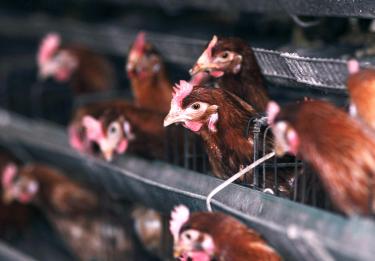Chinese health authorities on Saturday confirmed three cases of a strain of avian flu that had not before been found in humans.
Two of the patients have died in Shanghai and one is still critically ill in Anhui Province, the Centers for Disease Control (CDC) said yesterday.
CDC Deputy Director-General Chou Jih-haw (周志浩) said that 88 people have had close contact with the three victims, but the Chinese health agency said that so far they have not displayed any symptoms.
Chou said that although three human cases of H7N9 infection have been confirmed, it is still not clear whether this strain of avian influenza virus can be transmitted though human-to-human contact.
“In Taiwan, we used to find H7N3 and H7N7 virus infections in poultry, but so far that is has not been the case with H7N9,” Chou said. “The CDC has tested more than 3,000 cases of influenza infection since October last year, but has yet to find any cases of the H7N9 virus. Of the 136 cases of unexplained pneumonia investigated, three were found to be H3N2 and one H1N1; again none were tested positive for H7N9.”
Although most avian influenza viruses do not affect people, some do, one of which is H5N1, a highly pathogenic avian influenza virus.
“As of March 4, WHO data showed that there have been 622 confirmed cases of H5N1 infection, as a result of which 371 died, amounting to a mortality rate of as high as 60 percent,” Chou said.
The CDC added that it has stepped up inspections and monitoring of people traveling from China, Hong Kong and Macau. Those who develop related symptoms or have been in contact with poultry are to be sent to hospitals to be tested for the virus and not discharged until cleared of infection.
In addition, he said that people who plan to travel to China “should avoid any form of contact with poultry and if they have developed any of the above-mentioned symptoms they should inform officials at ports of entry when they return.”
CDC Director-General Chang Feng-yi (張烽益) said told a legislative hearing that while Taiwan has no recorded cases of human H7N9 virus infections, it has stepped up precautionary measures in light of the cases in China.
Immigration officials at Taiwan Taoyuan International Airport have been asked to intensify monitoring and inspection of passengers from China, Hong Kong and Macau, Chang said.
Meanwhile, the government has extended public access to subsidized anti-viral influenza drugs until the end of this month, as a precautionary measure against a possible outbreak of the virus.
Although there is no vaccine against the virus at present, existing information shows that H7N9 infection can be treated with Tamiflu, Chang said.
The CDC has been monitoring cases of pneumonia of unknown etiology and flu-like illnesses on a regular basis, but has not detected any H7N9 infections so far, he said.
Source: Taipei Times - 2013/04/02





















